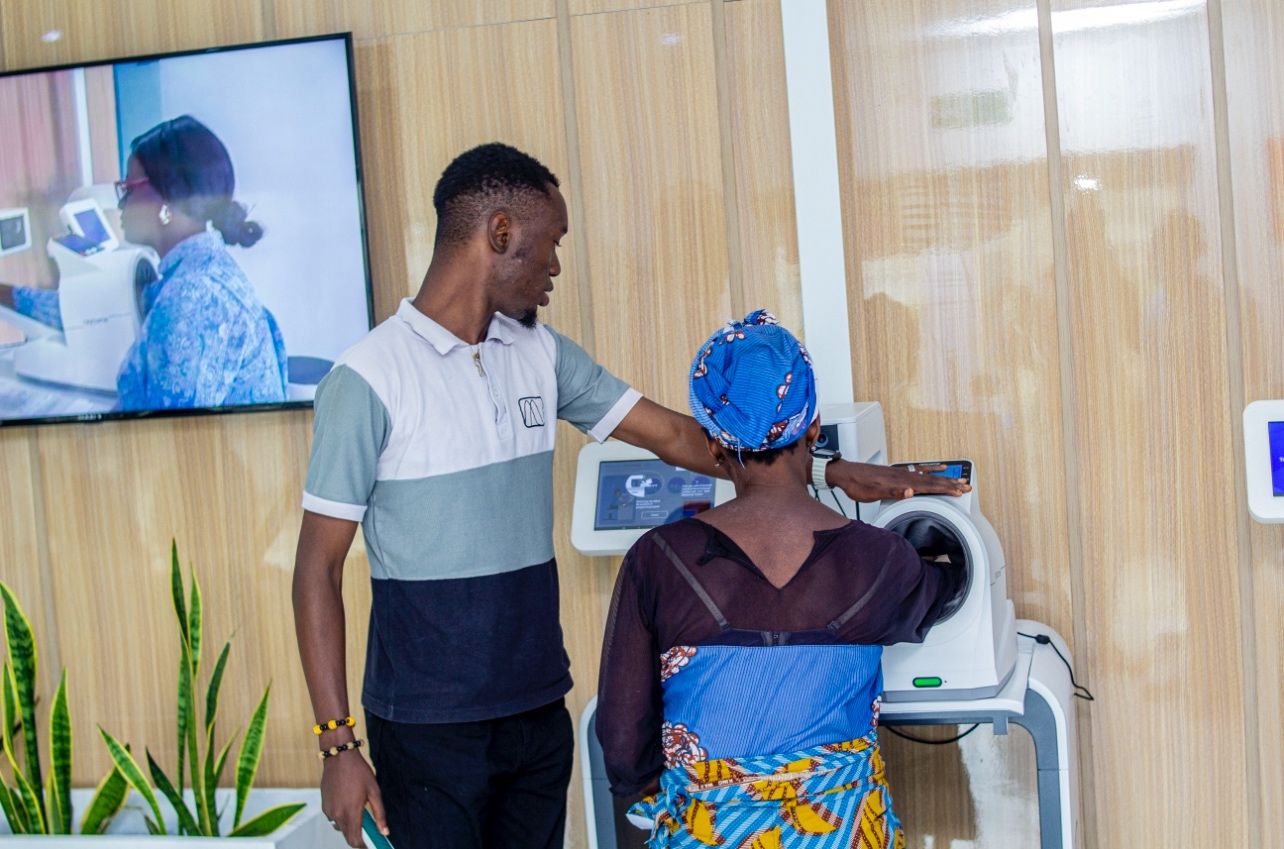Authors: Oluwatosin Idowu, Tunde Animashaun.
Metaphor, a diagnostic-focused CRO, is bridging the gap in Nigeria’s healthcare infrastructure through diagnostic innovations. The goal is to promote early detection and treatment of diseases that would otherwise burden the country’s healthcare institutions while gradually scaling tech to manage them effectively.
One such diagnostic innovation is the Metaphor Digital Health Kiosk, which integrates with a health monitoring app. Several outreaches have tested the kiosk’s capabilities and functionality, intimating participants with its ease of use and relevance to monitoring their health stats regularly.
By implementing this digital health tool, we can address healthcare gaps while generating real-time data that feeds into broader population health strategies.
Technological Innovation for Better Population Health
We find ourselves in a data-driven world, which is promising for the future of healthcare. For an underserved region like Nigeria, it provides an avenue to cost-effectively build and implement global standards of quality healthcare delivery through a comprehensive understanding of our disease epidemiology—who is most impacted by the condition and how it presents across different populations.
The Digital Health Kiosk is more than just an innovation that stands out. It forms the core of Metaphor’s mission to converge these real-world data points for better population health tracking and studies. Integrating digital health monitoring platforms with quality labs opens doors for research. Our outreach efforts gather insights directly from the population, allowing us to design more effective healthcare interventions.
Real-World Evidence of Health-Seeking Behavior
The relevance of Metaphor’s digital health innovation is further bolstered by the real-world insights gained from outreach participants.




The data gathered from participants confirmed that many people seek healthcare reactively, rather than proactively.
More than half of respondents (54%) do not get regular checkups, and most visit hospitals only when sick (66%). Cost (close to 50%) and convenience (over 30%) are highlighted as the biggest barriers, however, many need more education about diseases that develop silently to address some misconceptions that contribute to how they prioritize their health.
A strong majority (88%) of respondents indicated they would get checkups more often if it were easier and cheaper—like using the Kiosk.
Though a relatively minute sample size of the population, this data mirrors the reality from previous research about health-seeking behavior in Nigeria and other underserved parts of Africa [1–3]. The worsening economic situation is making healthcare a second priority when in fact, the economy cannot grow without good health.
Partners and collaborators, both government and private stakeholders, should see the opportunity of incorporating digital health services in facilities that even the most minority of the population can access easily (PHCs). Through this, we can build an integrated system to detect and respond effectively to arising challenges.
Allocating resources to measures that reduce the burden on our healthcare system can improve the overall health and economic outcomes for patients and healthcare institutions. However, its implementation must take into account certain limitations and constraints.
Empowering Health Equity by Addressing SDOH
To fully realize the potential of digital health in care and diagnostics, we must address broader social determinants of health (SDOH), such as financial limitations and access to technology. This is the path to true health equity and inclusion.
Global research aims to include more ethnically diverse groups to broaden the applicability of medical interventions. But for this venture to be truly relevant, we must first be diverse and inclusive in our region. This means ensuring our digital solutions can cater to all at a basic level, irrespective of finances, occupation, information and technology access, location, language and more.
For example, most outreach participants registered online and came with smartphones to download the app. However, many participants recruited from the roads either didn’t have smartphones or data. The way forward must include consideration for how to ensure this category of people benefits from global health innovations because they represent a significant part of our population.
A Healthier Future for All: Turning Innovation into Action
The journey toward better healthcare in Nigeria requires bold innovation and collaboration. By harnessing the power of digital health solutions like the Metaphor Digital Health Kiosk, we can bridge critical gaps in healthcare access and early diagnosis.
However, real change goes beyond technology—it demands inclusivity, addressing social determinants of health and ensuring that everyone, especially underserved populations, benefits from these advancements. Together, with partners, government and private stakeholders, we can build a healthcare system that empowers individuals, strengthens our institutions and drives both health and economic outcomes. The future of healthcare in Nigeria depends on our collective action today.
References
- – Abdulraheem, I. S.. Health Needs Assessment and Determinants of Health-Seeking Behaviour among Elderly Nigerians: A House-Hold Survey. Annals of African Medicine 6(2):p 58-63, June 2007. | DOI: 10.4103/1596-3519.55715
- – Tinuade, O., Iyabo, A., & Durotoye, O. (2010). Health-care-seeking behaviour for childhood illnesses in a resource-poor setting. Journal of Paediatrics and Child Health, 46(5), 238-242. https://doi.org/10.1111/j.1440-1754.2009.01677.x
- – A. Bedford, K. J., & Sharkey, A. B. (2014). Local Barriers and Solutions to Improve Care-Seeking for Childhood Pneumonia, Diarrhoea and Malaria in Kenya, Nigeria and Niger: A Qualitative Study. PLOS ONE, 9(6), e100038. https://doi.org/10.1371/journal.pone.0100038
